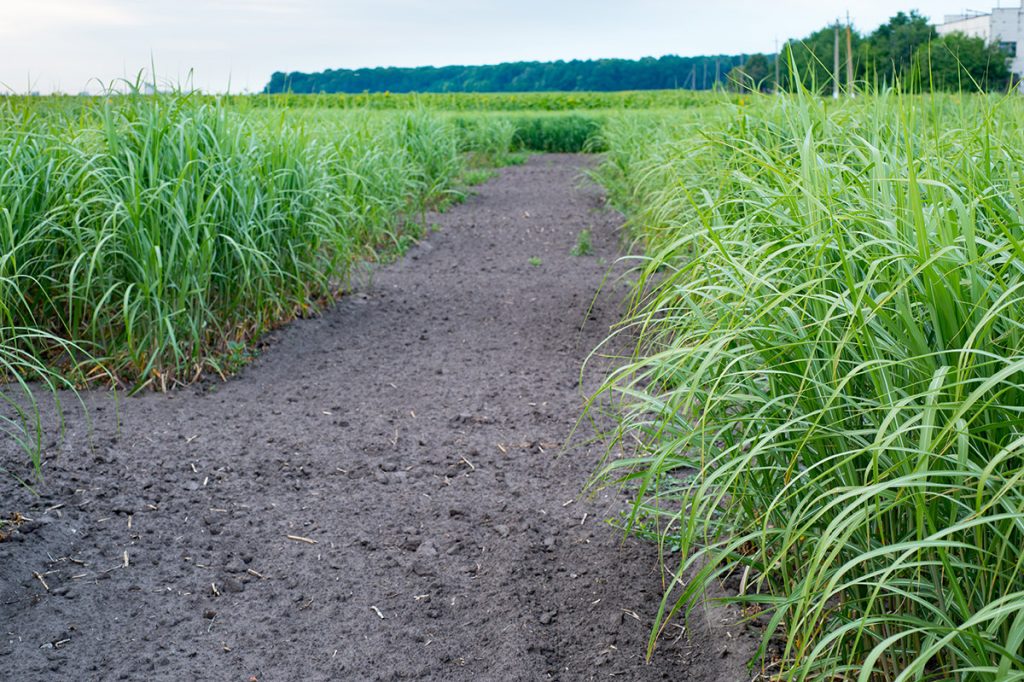
As the threat of climate change continues to grow, scientists, farmers, and governments are becoming increasingly determined to find new ways to mitigate the damaging effects of carbon dioxide. Renewable energy sources like bioenergy are being utilized as alternatives to coal and gas, while different agricultural practices are being implemented to help slow the release of carbon into the atmosphere.
One promising method of carbon sequestration and bioenergy production is the utilization of biochar. Biochar is an organic biomass by-product that not only sequesters carbon, but also helps to benefit soil health, improve water quality and retention, and discourage deforestation.
While biochar can be produced using many different types of plant materials and biomass, switchgrass has been shown to be a highly effective biochar feedstock.
What is biochar?
Biochar is another term for charcoal that is produced organically and added to the earth as a soil enhancer. It is a by-product of pyrolysis, the process of heating or burning organic biomass to cause decomposition without the use of oxygen. Biochar has been used for thousands of years to improve soil fertility and health.
As a fine, highly porous material, biochar helps to trap carbon and other microorganisms in the soil. This prevents these nutrients from being released into the air as harmful CO2 or being washed away by rain and irrigation.
For this reason, biochar is an effective tool for carbon sequestration and nutrient retention. In addition, biochar can be used for a long list of other applications, including biofuel, construction materials, wastewater treatment, decontamination, textile production, and more.
What is switchgrass?
As a warm-season, native perennial grass, switchgrass is an easy-to-grow, affordable grass crop. Grown all across North America as a natural component of tallgrass prairie, switchgrass can commonly be found across the Great Plains, the southeastern US, the Rocky Mountains, Mexico, and Canada.
With its deep root systems, switchgrass can store plenty of water and nutrients to produce high yields when grown under optimal conditions. Resilient and adaptable, it can be grown on a wide variety of soil types and is tolerant to drought.
Switchgrass has already been recognized as an efficient biomass component for biofuel production to reduce the country’s dependence on foreign oil. It is also highly beneficial for protecting soil and retaining nutrients, while also being resistant to pests and diseases.
What are the benefits of using switchgrass for biochar?
Due to its low cost and ease of growth, switchgrass is an optimal source of biomass to be used in biochar production. Its deep roots help to build carbon in the earth, which allows it to retain high levels of carbon within the soil when turned into biochar. Switchgrass also contains lignin, an organic biopolymer found within the plant’s cellular walls that makes it an effective biochar feedstock.
Studies on the use of switchgrass for biochar production have demonstrated that the energy content of the carbonized biochar produced makes it a high-quality solid fuel. Farmers have designed gasifiers specifically for turning switchgrass into biochar and have even provided open-source instructions for other farmers to use. This way, farmers can decrease their reliance on more expensive methods of soil restoration, such as synthetic nitrogen fertilizers or tillage.
The future of switchgrass for biochar
As the use of alternative energy sources and climate-friendly agricultural practices continues to rise, the utilization of switchgrass for biochar will certainly increase. With sustainable, renewable methods of producing energy and retaining carbon in the soil, farmers across the country can help mitigate climate change and protect their land from degeneration.
Interested in learning more about the benefits of growing switchgrass for biochar and other applications? Reach out to us at All Native Seed. We offer several CRP-ready seed mixes that contain switchgrass and other beneficial seeds, so you can begin your project today.
